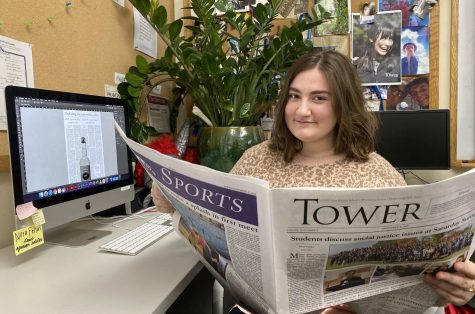Education on donations to Masters receives mixed reviews
As part of Ninth Grade Seminar classes, students are educated on donations to Masters. While some have said they found the lesson enlightening, others said it made them uncomfortable.
December 2, 2019
Every year in Ninth Grade Seminar classes, first-year students are taught about charitable giving and the administration of nonprofits. While the benefits of donating to charity seem straightforward, the decision to include a lesson on donations to Masters in the curriculum has had mixed reviews.
Mary Ryan, Associate Director of Institutional Advancement and a Masters alumna, teaches the lesson. She said there was always a lesson on the history of Masters in Ninth Grade Seminar classes, but that the philanthropy lesson was born out of student feedback four years ago. “There was always a demand from students to learn more practical skills. With such a socially-conscious student body we were interested in talking about charitable giving and what that means,” she said.
She said that the lesson begins with a broad discussion about philanthropy, and that students share their top charities: four years ago, most of the charities were animal and environmental groups, but last year it was centered around legal aid and immigrant groups. Ryan also includes MISH donations in these discussions with the aim of making students think about where their dollar goes.
For the second part of the lesson, Ryan said she focuses on Masters. Most students, Ryan said, don’t realize that Masters is a 501c3 charity, and the goal of her lesson is to “pull the curtain back” on the operating budget. She added that students are often surprised that Masters and other independent schools all rely on contributions.“It’s shocking to some people, because tuition is expensive,” Ryan said.
Sophomore Patrick Curnin-Shane said while he was happy to learn about charitable giving in a broad sense, last year, he and his classmates felt a sense of “trepidation” when the conversation shifted to Masters. “It was weird,” Curnin-Shane said. “I found it enlightening to see the breakdown of spending that Masters does, and seeing how much of it goes to financial aid was really joyful for me. But it was weird to learn about having to give back to Masters.”
He added, “I wouldn’t put this lesson in Freshman Seminar. The whole time we are at school should be the time we are convinced to give back to the school when we are gone. If you have to call yourself a king, are you a king?”
In contrast, current 10th grader Clyde Lederman said he found the lesson interesting and saw it as an educational explanation of how Masters is run. “We all go to the school and reap the benefits of donations,” Lederman said. “Even though it might make some folks uncomfortable, it is not unethical for them to ask us to contribute more than we already do.” Lederman added, however, that he felt a disclaimer should have been used when the lesson shifted its focus from the broad discussion of charitable giving to Masters-specific information.
“The goal is not to make anyone uncomfortable, but we are not apologetic about the fact that the school relies on contributions,” Ryan said. “We try to be transparent about it.”




